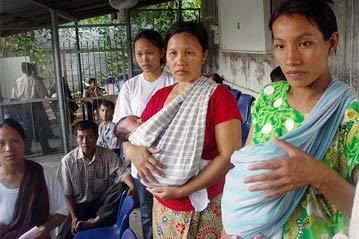
Mothers hold their babies after their release into UNHCR custody by Malaysian authorities.
(Photo courtesy of UNHCR/E.Tan)
Read here article by Yanti Ismail on UNHCR Website
Excerpts:
"... The office of the UNHCR in Kuala Lumpur was abuzz with excitement as staff awaited the arrival of six babies aged between 30 and 40 days – after being released on Thursday from an immigration detention facility.
The babies were among a group of 25 persons of concern, who were released into UNHCR custody by Malaysian authorities.
They and their relatives – all from Myanmar – had been arrested and held for up to four weeks for not having valid immigration documents.
The Malaysian Immigration Act does NOT distinguish between a refugee and an immigrant, thus refugees and asylum seekers are sometimes arrested and detained in the immigration holding facility.
Volker Türk, UNHCR representative in Malaysia, said:
"We are grateful to the Malaysian authorities for this humanitarian act of releasing these babies and their parents from the immigration detention.
Refugees are a group of people with special protection needs and UNHCR provides this for them.We are happy that they have been released back into our care. Our immediate concern now is for the health and welfare of the newborn babies and their mothers."
The adults were relieved to be out of custody and under the protection of UNHCR.
Some were hungry. "Can we have some food, please?," asked one woman, adding that she had been so excited at the prospect of freedom that she had given her lunch to another detainee in the immigration facility.
Others were worried about health issues.
Min Thlang, an asylum seeker from Myanmar, said her 40-day-old son, Simon, had kidney problems.
"Because I was detained, I have missed two appointments with the hospital where they were going to give my baby medication," she said, adding that she had been told her boy would need a kidney transplant but was too young for the operation now.
"We were in detention for a few weeks and my baby's health has deteriorated," said Min Thlang. "Although I am happy that I have been released, my heart is full of worries for my baby's future and for my husband who is still in detention."
Khim Mung was also worried about the health of her child, 40-day-old Robert. The asylum seeker from Myanmar said her body hadn't been producing sufficient milk for Robert because she had not been taking enough nutrition while in detention. She shrugged at queries about her post-natal health conditions.
" I want to take Robert to the hospital right now," she said, impatient to leave. "I am very, very happy to be released and now I need to take care of family again."
Rahimah Bee, a Muslim from Myanmar, wept as the celebrations swirled round her baby and husband at the UNHCR office. "These are tears of joy," she reassured staff. "I was held for 16 days and it was the hardest experience of my life. I am so grateful that I am released. That is why I am crying."
Rahimah said that for her, the hardest part about being in detention was that she could not decide how to use her time. Detainees had to observe timetables set by the detention centre, even when it was inconvenient for them and their babies.
"Even when my baby was feeding or sleeping, if it was time to queue for head count, then I had to get up," said Rahimah, who was looking forward to a bath and a sleep.
As of January this year, there were some 43,000 persons of concern registered with UNHCR in Malaysia, including some 27,000 from ethnic minority groups in Myanmar.
Many live close to illegal immigrants, which makes them vulnerable during government crackdowns on illegal immigrants.
No comments:
Post a Comment